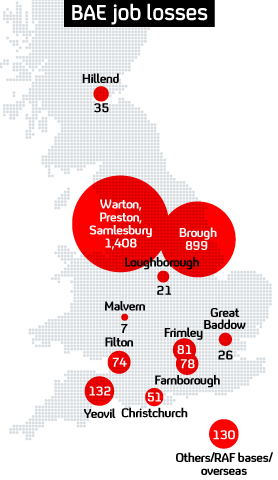BAE Systems to cut almost 3,000 UK jobs
As BAE Systems announces several thousand job losses at a number of its UK locations, a defence economist tells Channel 4 News government spending cuts are to blame.

Defence giant BAE Systems has confirmed it is making almost 3,000 job cuts. Among the sites hit by the announcement are: Brough, East Riding of Yorkshire (899 job losses), Samlesbury, Lancashire (565), Warton and Preston, Lancashire (843), and Yeovil, Somerset (132).
Defence economist Professor Ron Smith from the University of London told Channel 4 News government defence cuts are at least partially to blame for the job losses.
Professor Smith said: “This announcement is clearly following on from the defence spending review, though even before the defence review, the UK wanted to cut the number of Typhoons.
“But it’s also happening in a wider context. In the US and Europe, there are planned cuts in defence budgets and wider markets for their products have shrunk.
“Although there are some booming defence export markets, like India and Brazil, they are very competitive. Others, Iran and Syria for example, are restricted by defence export regulations.”
The firm ended days of speculation by giving details of a huge redundancy programme, saying it needed to maintain competitiveness.
Ian King, chief executive of BAE Systems, said: “Our customers are facing huge pressures on their defence budgets, and affordability has become an increasing priority.
“Our business needs to rise to this challenge to maintain its competitiveness and ensure its long-term future.”
Eurofighter slowdown
The potential job losses at Brough, Samlesbury, Preston and Warton, affecting both the military aircraft division and the head office, are linked to the changes in Typhoon and F-35 production, said BAE, while those at Christchurch, Frimley, Hillend, Malvern, New Malden and Yeovil are associated with reducing workload on information programmes.
BAE said the potential job losses at Farnborough have been driven by a reduction in Harrier and Tornado work, and job cuts at Royal Air Force bases and overseas by changes to the support requirements for Harrier and Tornado.
All the cuts have been driven by the need to remain competitive, said the company, which employs around 40,000 workers in the UK.
Professor Ron Smith told Channel 4 News that it is not just BAE which is slowing down production of Eurofighter: “Other partners in the Eurofighter project will also be be making decisions on their future because of among other things, defence budget cuts.
And he pointed out that the firm has made efforts to mitigate the job losses: “BAE has tried to diversify the use of some of these sites to keep them going but has had great difficulty doing so because it is actually quite hard to convert military production facilities to other uses.”
‘Body blow to manufacturing’
TUC General Secretary Brendan Barber told the Labour Party conference in Liverpool that the job losses were “yet another devastating body blow to our manufacturing base”.
BAE announced that it had started a consultation about ending manufacturing at the Brough site, which currently employs 1,300 workers. The firm said most of the job cuts would be in its military aircraft division, which is being affected by a slowdown in orders for the Eurofighter Typhoon combat jet.
BAE Systems Chief Executive Ian King said: “Some of our major programmes have seen significant changes.
“This transformation process is not going to be easy. We understand that this is a time of uncertainty for our employees and we are committed to working with them and their representatives to explore ways of mitigating the potential job losses.”